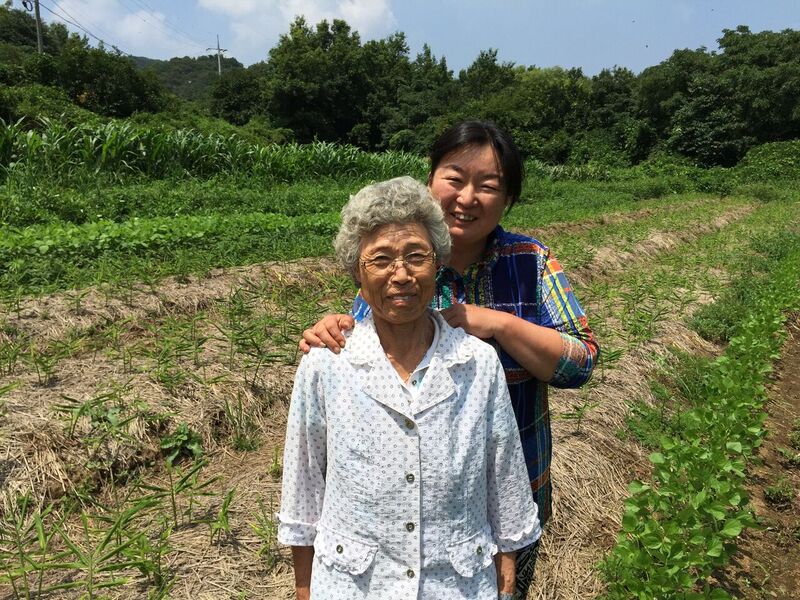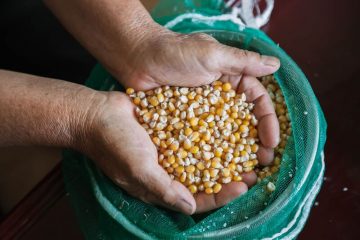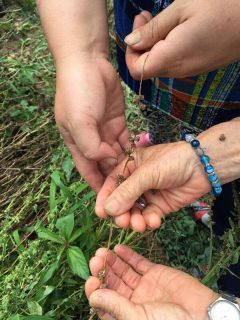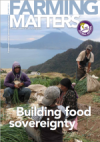The Korean Women’s Peasant Association (KWPA) is a leader in South Korea’s food sovereignty movement. Founded in 1989, it is an association that encompasses hundreds of local women farmers’ groups. Intergenerational exchange of knowledge and experiences among women is at the heart of their work. Through this exchange, a new generation of peasant women are challenging the roles traditionally attributed to women in farming, while the older generation share their lifetime of knowledge. This is a good example of how women’s indigenous knowledge is a crucial ingredient for sustainable farming and food sovereignty.

South Korea’s food sovereignty movement is facing a colossal fight. The country is emerging as one of the world’s biggest importers of edible genetically modified (GM) crops. On top of this, the current government aims to produce and sell GM crops, including one of the Korean people’s most important staples: rice. Rapid industrialisation, combined with pressure from global food markets, has taken its toll on South Korean farming. The percentage of the total population that farm has reduced from 50% to less than 7% today, and a quarter of the country’s farmland has dis-appeared since the 1970’s, when Green Revolution technologies were first promoted. Remaining farmers have been forced to join ‘development projects’ and take part in modernisation efforts that disregard their indigenous knowledge and skills in favour of input-intensive farming techniques.
Grandmother’s knowledge
Women have been disproportionately affected by these changes in Korea’s agriculture. As a consequence of the country’s patriarchal society, many women lack access to capital and land resources. This has led to exclusion of women from the government’s push to ‘modernise’ their farms. Many women have remained small scale producers active in the informal economy, but struggling to access markets for their products. Moreover, they have been marginalised in shaping formal economic and social policies.
Yet, every dark cloud has a silver lining: these women continued their indigenous farming practices. Most of these women are now over 60 years of age and known as hal-mo-ni (grandmothers). These grandmothers know how to produce, process and conserve food, as well as make clothing and shelter. They have kept the knowledge and skills needed to save and breed their indigenous seeds. Their practices are rooted in biodiversity and they manage their agroecosystem to maintain complex polycultures (see box).

Activist farmers
Recently, some younger women farmers, members of KWPA, who had learnt to farm in the industrial farming system, started to actively question the need to constantly purchase inputs, such as seeds and fertilizers. These activist farmers also identified the need to make the valuable role of women peasants more visible in Korean society. They decided to focus their work on using women’s knowledge of seeds and breeding to revive traditional varieties of crops through collecting and multiplying indigenous seeds. Moreover, peasants’ seeds symbolically represent traditional knowledge, safe food, and safekeeping of genetic resources as well as cultural heritage.
Women peasants don’t have degrees but they are experts
Sowing seeds
The first indigenous seeds that Hoengsoeng Women’s Peasant Association, a member of KWPA, decided to cultivate were beans. Beans have played an important role throughout Korean history. Despite their importance, it was difficult to find indigenous seeds. Finally they obtained seeds from an activist from the Anti-GMO Korea network whose acquaintances had access to the seedbank of the National Agricultural Cooperative Federation. Each member of the association was given three types of bean to cultivate. The idea was to meet a year later to exchange experiences and seeds. All but one woman failed to cultivate their beans. The successful peasant happened to be one of the grandmothers. She was the only one with the necessary knowledge and skills to grow the beans. This was an important moment for the KWPA activists. They realised that the exchange of knowledge and skills between old and young generations of women is key to building an indigenous seed movement. “Women peasants don’t have degrees in seed breeding, but they are experts,” said Yoon Keum Soon, a KWPA activist from Seong-Ju.
Since then, the KWPA activists have been building an indigenous seed movement. They started by collecting seeds and recording indigenous knowledge from the grandmothers in their communities. Their activities reach across the country and have been steadily expanding. KWPA women now are active in more than 15 cities and eight provinces nationwide. Besides organising seed festivals and publishing and distributing information on peasant’s rights to seeds, two notable activities are their communal seed farms and a farmer-owned cooperative.
Communal seed farms
Ae-gi Jeong, 83 year old grandmother:
“Hoengsong is in the mountains so we try to use small plots of land effectively. No matter how small the plot might be, we always try to plant various crops. In the garden plots we plant soybean and sesame seedlings between corn. After the corn is harvested, the plot gradually turns into a soybean and sesame field. The corn stalks are fed to cows. We also plant soybean and sesame around the paddy fields, and intercrop local lettuces and chillies.”
Since 2009, KWPA has started more than 20 indigenous seed production farms. Only three of these receive governmental support and most are managed by groups of women, each with their own plot of land, who share the work collectively. Urban citizens also help managing a number of these farms, which, in turn have become venues where children and adults can learn about the importance of indigenous seeds.
For many reasons, putting indigenous seed farming into practice has not been easy. Even with years of farming experience, there is still a lot to learn. Each crop requires different methods of cultivation, selection and preservation. For example, Han Young Mee, a peasant from Hoengseong with more than 20 years’ experience with industrial farming, explains that when she tried to preserve seeds she was unsuccessful because animals ate them or she had forgotten where she had stored them. Moreover, when some indigenous pink potato seedlings that she got from another locality failed it became evident that caring for seeds also requires understanding of the local climate and soil.
To overcome these problems, KWPA developed a mentorship programme with grandmothers. This was rather easy because most villages have a good number of both young and elderly female farmers. When they come together, these farmers share their knowledge of farming and cooking, thereby learning from each other. With the help of KWPA, many of these women document their lessons so that more farmers can put indigenous seed farming into practice. For example, a KWPA group on Jeju Island published a book about grandmothers’ way of farming and how to grow and keep various indigenous seeds.
Seeds passed through all the community members’ hands
Communal resources

safe food, and safekeeping of genetic resources.
Photo: Hyo Jeong Kim
In Haman, a county in the south of the country, a group of peasant women communally manage 30 different crops on 0.2 hectares of land. One practical challenge they have been facing is the amount of time needed to tend to the seed farm. Farmer Han Swoung Ah explains how difficult it is to combine childcare, work on her own farm and on the communal plot: “I quarrelled with my husband many times about working on the communal field. He hates that I neglect our family farm.”
Despite the challenges, the importance and value of community has become clear through the women’s experience on the seed farms. For instance, without community support, a bad harvest of a seed crop makes it almost impossible to find planting material for the next year’s crops. In the past, peasants sustained their farming through local communities by sharing their seeds, labour, knowledge and skills. In this way, seeds passed through all the community members’ hands and had a character of public property. The communal seed farms are reviving this type of sharing.
Farmers’ cooperative
The members of KWPA realised the importance of building solidarity not only among peasants but also between peasants and consumers. Therefore, they set up the Sister’s Garden CSA (Community Supported Agriculture) box scheme. It started in 2009 as a social enterprise with support from the government to pay two staff members. Recently, they transformed the organisation into a cooperative such that each of the 200 participating peasant women became members. The CSA’s success has been such that in seven years it has grown from one community providing weekly boxes to 100 families to 15 communities across South Korea reaching more than 2000 families. In contrast to the industrial food system, consumers are in direct communication with producers and learn about their planting decisions and seasonal limitations. Besides accessing affordable seasonal products, consumers are more involved with the work of the KWPA through voluntary work at the indigenous seeds farms or by joining indigenous food cooking courses held monthly in Seoul.
The cooperative is also seen as a success in terms of economic empowerment for the peasant women. This is particularly the case for the grandmothers who otherwise have difficulty accessing markets for their produce. In this sense, the approach that connects producers and consumers is useful for ensuring fair compensation to peasants for their work.
Moving forward
A long term goal is to produce and sell more indigenous crops through the Sisters’ Garden Cooperative and to set up an agroecology school that will further support this intergenerational exchange. KWPA’s ambition to better connect the seed movement with the cooperative is not only an opportunity to continue strengthening the relationship between the older and younger generations of women peasants, but also to forge links with other like-minded organisations in East Asia. The first steps in this direction have been taken between 2015 and 2016, when KWPA women farmers visited and exchanged knowledge with members of CAEF (Community Agroecology Fund) in Surin, Thailand and the Agroecology School of La Via Campesina member organisation Serikat Petani Indonesia. In this way, more people will be able to gain the knowledge and skills needed to successfully work with indigenous crops. In 2012 the KWPA was awarded the food sovereignty prize for their work.
Hyo Jeong Kim (sheenkimm@gmail.com) is a feminist researcher at the Ewha Womans University working on transnational activism, social economy, food sovereignty and agroecology in Asia.

